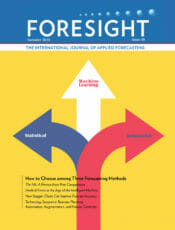
Following is editor-in-chief Len Tashman's preview of the Summer 2020 issue of Foresight: The International Journal of Applied Forecasting. Preview of Foresight (Summer 2020) The Summer 2020 issue of Foresight—number 58 in this, our fifteenth anniversary year—addresses fundamental issues related to (a) the criteria for choosing among forecasting methods, (b)



